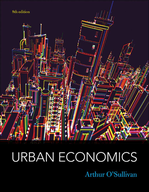Solution Found!
Consider a city that imposes a new pollution tax that increases the average cost (and price) of the good produced by a polluting industry by 4 percent and improves the city’s environmental quality by 20 percent. The price elasticity of demand for the city’s export goods is -1.50. a. The total output of the polluting industry will decrease by ____ percent, computed as. . . . b. The city’s equilibrium wage will [increase, decrease] because. . . . c. The city’s equilibrium employment will increase if the elasticity of the supply of labor with respect to environmental quality is relatively [large, small]. d. Use a supply-demand graph of the urban labor market to illustrate your answer to (c ) .
Chapter 5, Problem 8(choose chapter or problem)
Effects of Environmental Policy
Consider a city that imposes a new pollution tax that increases the average cost (and price) of the good produced by a polluting industry by 4 percent and improves the city’s environmental quality by 20 percent. The price elasticity of demand for the city’s export goods is -1.50.
a. The total output of the polluting industry will decrease by ____ percent, computed as. . . .
b. The city’s equilibrium wage will [increase, decrease] because. . . .
c. The city’s equilibrium employment will increase if the elasticity of the supply of labor with respect to environmental quality is relatively [large, small].
d. Use a supply-demand graph of the urban labor market to illustrate your answer to (c) .
Questions & Answers
QUESTION:
Effects of Environmental Policy
Consider a city that imposes a new pollution tax that increases the average cost (and price) of the good produced by a polluting industry by 4 percent and improves the city’s environmental quality by 20 percent. The price elasticity of demand for the city’s export goods is -1.50.
a. The total output of the polluting industry will decrease by ____ percent, computed as. . . .
b. The city’s equilibrium wage will [increase, decrease] because. . . .
c. The city’s equilibrium employment will increase if the elasticity of the supply of labor with respect to environmental quality is relatively [large, small].
d. Use a supply-demand graph of the urban labor market to illustrate your answer to (c) .
ANSWER:Step 1 of 4
a.
When the city imposes the new pollution tax that increases the average cost (and price) of the good produced by a polluting industry by 4 percent and improves the city’s environmental quality by 20 percent. The price elasticity of demand for the city’s export goods is -1.50. a. The total output of the polluting industry will decrease by 6 percent, computed as 4 % X 1.5 = 6 %.
Thus, the total output of the polluting industry will decrease by 6%.
